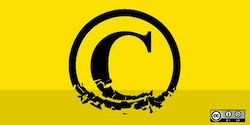How do you solve a problem like copyright?
There are many things that are wrong with our copyright law, but the part that says you've got to compensate the rightsholder and get their permission if you want to profit from their work, isn't one of them.

Image: CC-AT-SA Flickr: Opensourceway
A few weeks ago Cooks Source, a small for-profit magazine, published a piece on medieval apple pie recipes by Monica Gaudio. They had picked up the piece from a website Gaudio had published it on and neglected to inform her that they were using her writing, or to compensate her. When the writer complained, the Cook’s Source editor responded with the claim that everything published on the Internet is in the public domain.
The story caused what seemed the entire Internet to descend on Cooks Source and pretty much put them out of business. Of course, the editor's assertion, that content published on the Internet is in the public domain, is manifestly untrue - it displays a profound lack of understanding of copyright law. And yet, chances are at least some of the people who were so outraged by the editor's behaviour and comments are perhaps not quite so observant of copyright law when it comes to other matters, say the downloading of music and movies. The story illustrates some complex questions on the thorny relationship between copyright and digital content.
To recap where I stand on digital content, I firmly believe that it is a public good, within the strict economic definition of "public good". A public good has two characteristics: it is non-rival and non-excludable. Non-rival means that my consumption of the good doesn’t diminish the amount of it available for you to consume. Apples are clearly rival: If I eat one, you can’t eat it. A piece of music is non-rival: if I listen to it, that doesn’t stop you from doing so too. Non-excludable means that you can’t stop me from consuming the good. Again, apples are excludable: You can stop me from eating the apple by keeping it inside your locked house. With pieces of music, it’s become technologically practically impossible (DRM notwithstanding) to stop me from making an infinite number of copies. So pieces of music, and other digital content, economically behave as public goods. What this really means is that using the market to distribute the public good—content in our case—is neither possible, nor desirable as it doesn't produce the most efficient outcomes.
So although the editor of Cooks Source may have tried to get away with arguing her case in the above terms, she still wouldn't be justified. The simple fact that content behaves as a public good from an economic standpoint, does not mean it's free for the taking. It especially does not mean that it's right for a company to take content created by someone else and, without compensating them, make a profit from it. There are many things that are wrong with our copyright law (for instance the way it makes us criminals for ripping our CDs to put them on our iPods), but the part that says you've got to compensate the rightsholder and get their permission if you want to profit from their work, isn't one of them.
All too frequently, copyright is used to protect the vested interests of established distribution industries (think record labels), rather than for its original purpose - to incentivise and protect creators. Hopefully, the Cooks Source case shows that there is still some recourse for creators whose copyright has been infringed, and that copyright still benefits creators. What is worrying is that most content creators don't have the resources to really enforce their rights through the courts, so they have to rely on being able to publicise their case sufficiently for the public at large to act as judge and jury, as in the Cooks Source case. Unfortunately, for every Monica out there, there are countless other artists, musicians and creators whose work is being taken advantage of with no compensation and whose stories don't reach the general public.
David Cameron recently announced a review of copyright law in the UK. Some of his comments were very encouraging, others somewhat worrying. We need to kick off the public debate now to help our government redress the copyright balance in a way which reflects the public-good nature of of digital content and returns to the original intent of copyright.
Milena is an economics & politics graduate, an IT manager, and a campaigner for digital rights, electoral reform and women's rights. She blogs at milenapopova.eu and tweets as @elmyra
Share this article











Comments

Latest Articles
Featured Article
Schmidt Happens

Wendy M. Grossman responds to "loopy" statements made by Google Executive Chairman Eric Schmidt in regards to censorship and encryption.
ORGZine: the Digital Rights magazine written for and by Open Rights Group supporters and engaged experts expressing their personal views
People who have written us are: campaigners, inventors, legal professionals , artists, writers, curators and publishers, technology experts, volunteers, think tanks, MPs, journalists and ORG supporters.






Comments (0)